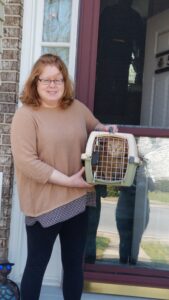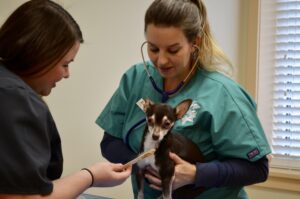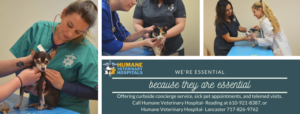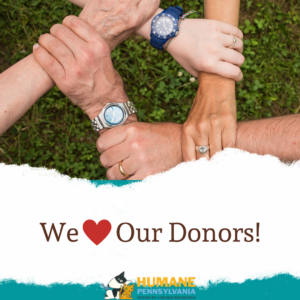Written by: Leann Quire, Director of Shelter Operations, Humane Pennsylvania
Are you feeling lonely while social distancing? Has your increased screen time watching kitten videos and seeing your relative post 900 videos of her dog making the same face (this is me, I am that person) making you seriously consider adding a furry friend to your home of isolation? Are you struggling to decide if it’s the right time to adopt? Adding a pet to your family is a serious decision that should not be taken lightly. Whether you are considering a temporary stay, like fostering, or a more permanent option like adoption, there are things you should consider ahead of time. There are also key things you can do to help you and your new pet during their acclimation period to give you both the best chance at success in your new found relationship. Read on to find out more!
What should you do before you bring a new animal home?
Talk to everyone in your household. Ensure that everyone in the home who plans to play a part in the animal’s life, or simply interact with the animal on a regular basis, are all on the same page with expectations or concerns. Everyone needs to be ready to put in the time and effort to help with training, cleaning, exercising, and socializing. This also includes roommates. If you share any common space with someone else, that person will play some part in the animal’s life, so it is important that considerations are taken to make sure all parties are on the same page.
Evaluate your finances. While it can be difficult to know if you will ever be financially “ready” for a pet (none of us have a crystal ball to know what the future holds) it is good to still discuss finances and make sure you can cover the animal’s needs, which should include having a plan for preparing for emergency cases. This preparation can include setting a credit card aside specifically for pet emergencies, devoting a portion of your paycheck each week to an emergency fund, or researching some of the common things that can happen and how much they typically cost so you have an idea of what vet bills can run so you are not blindsided by even just the routine care. You certainly do not need to be wealthy to provide a loving home to an animal, but there is a level of responsibility that needs to be acknowledged and planning ahead of time can prevent heartache in the future. This may even help you decide what type of animal is best for you as some animals are generally more high maintenance than others. Since you don’t have a crystal ball to refer to, if you do find yourself in tough times, whether it be from a job loss or death of a family member, there are thankfully many resources to help you get through temporary hardship without having to give up your furry friend. There are pet food banks and organizations specifically devoted to helping with emergency vet care. These resources shouldn’t be part of your expectations when planning, but are important to know they are out there if you fall on hard times.
Research! It is common for people to say, “I grew up with such and such pet twenty years ago, so I know all there is to know about caring for them.” Fortunately, animal care guidelines and research has expanded exponentially over the years due to an increased interest in the animal welfare field. Because of this, the training or care you applied to
 your pet two decades ago may now be proven to produce negative results, and there are new training techniques that are safer and provide a better experience for you and your pet! In addition, there are many people who pick their dog based solely off looks, which can pose problems. While each dog is an individual and even pure bred dogs do not always display typical breed traits, there is still research that should be done to make sure you are able to provide a lifetime commitment. For example, if you rent and have a 40-pound weight limit, your research will tell you that the St. Bernard puppy you fell in love with is going to turn into a dog that is 3 times the size of your approved weight limit! Do you spend your weekends watching Netflix with the occasional short walk to get some air? Then a pug might show up on your list of couch potato dogs as opposed to the high energy herding or terrier breeds.
your pet two decades ago may now be proven to produce negative results, and there are new training techniques that are safer and provide a better experience for you and your pet! In addition, there are many people who pick their dog based solely off looks, which can pose problems. While each dog is an individual and even pure bred dogs do not always display typical breed traits, there is still research that should be done to make sure you are able to provide a lifetime commitment. For example, if you rent and have a 40-pound weight limit, your research will tell you that the St. Bernard puppy you fell in love with is going to turn into a dog that is 3 times the size of your approved weight limit! Do you spend your weekends watching Netflix with the occasional short walk to get some air? Then a pug might show up on your list of couch potato dogs as opposed to the high energy herding or terrier breeds.
Evaluate your schedule. This is a big one to consider right now. Just because you have the time now does not mean you will have the time when you go back to your regular schedule. If you didn’t feel you had enough time before working from home or cutting back your hours, it might be a good idea to consider fostering instead of a full-time commitment. Who will watch your pet while you are away? Thankfully, there are many options for pet-sitters and doggy daycares, as well as reliable neighbors and family members. You will want to research this ahead of time though, because they can be costly and certain daycares require vaccines and interviews before booking appointments. You might be thinking that because you are home now more than usual, wouldn’t that be the best time to train a puppy? Yes, and no. Puppies require consistency with training for weeks and months. If your situation were to go back to normal in a month, it is unrealistic that your 3-month old puppy is going to be able to be at home alone for a ten-hour shift. So, consider your training schedule not only for your current situation, but especially for your “normal” situation since you don’t know when that could resume.
You’ve decided you are ready to foster or adopt. What’s next?
Gather supplies. You will want to make sure you have what you need before bringing your new pet home. For a cat, this includes purchasing the appropriate amount of litter boxes and determining the best place to set them up, food and water dish, toys, scratching post, food and treats, carrier, bed, etc. For a dog, this might mean a crate to help with training, food and water dish, food and treats, leash and collar, toys, identification tags, etc. For cats, it is suggested to set them up in a smaller room with all of their supplies to create a safe place for them to get adjusted into the home. For dogs, you will want to carefully consider where the crate and dishes will go, especially if you have other animals in the home.
Where to put these supplies? Cats can be more prone to stress and difficult to adapt to change, so putting all of their essential items in a smaller area before giving them full access to your home, even if you live in a smaller home or apartment, can be essential to a proper start. Even if you aren’t bringing a puppy home, a crate can be a good tool for training and create a safe space for your dog. Dogs are den animals and the small, covered feeling of a crate can imitate the feeling of being in a den. In addition, you never know when your dog will need to stay in a crate or cage at an animal hospital, relative’s home, or in an emergency situation, so it can be good to make sure they are at least exposed and have a positive experience with one. My dogs will often choose to take a snooze in their crate over many different options of pet beds and the couch.
Pet proof your home. If you have lots of plants around your house you may want to check and make sure they aren’t on the list of plants that are poisonous to animals if eaten. Keep wires out of reach and eyesight, especially for puppies and kittens. Keep medications and household cleaners out of reach. Look for holes in your walls that a small animal could fit into.
The animal is home! How do I acclimate them?
Set up a vet visit. Even if you just adopted your pet and they are said to be up to date with their vaccines, it is important to establish a relationship with a veterinarian immediately. If your animal does get sick or have an emergency, you may not be able to quickly get into a regular vet hospital as a new client and will be forced to go to an emergency vet hospital where you will most likely pay significantly more money. Establishing a relationship with a vet is helpful so you can ask any questions you may have about diet, exercise, and overall health.
Resist having visitors over right away. That will be easy right now as you should be practicing social isolation and shouldn’t have anyone who doesn’t live in the home over to visit. However, during normal circumstances it is important to let your new pet adjust to you and the home before having strangers over. This is not the time for a welcome home party. Even the most secure and sociable animal can feel stressed and overwhelmed by a new environment, and you do not want to trigger those stressors and cause anxieties that could affect the animal for the rest of their lives.
Create a schedule even if you are home all of the time. Try to stick to the same schedule for feeding and potty breaks and prepare to take your new dog out more frequently during the adjustment period, particularly if they are not housebroken. Even if you work from home normally and are often home it is good to make sure your animal can be alone or else they may develop separation anxiety. Make sure when you leave you make the “alone time” positive for your pet. You can do this by providing a good treat. For example, give your dog a Kong filled with a tasty treat to eat while you are away and then remove the Kong when you are back. Start with small trips and work up to longer ones. Maybe it’s a quick trip to the mailbox, a longer trip to the grocery store, and working up to a few more hours. Don’t make a big deal about coming and going. Provide lots of physical and mental enrichment when you are home so they are tired when you aren’t there.
Set boundaries. This is key for starting on the right foot. Don’t allow animals to do things you aren’t intending to let them do in the future because it will be harder to change the behavior after you have allowed and enforced it. For example, if you don’t intend to let the pet sleep in bed with you don’t let them do this the first week they are home because you feel bad they were in a shelter. Think of it like children; we give them rules and boundaries to protect them because we love them and know it is critical to their wellbeing and acclimating to society. Setting boundaries with your dog allows you to build your relationship and reduce the chance of problems.
Work on socialization and bonding. You shouldn’t set up puppy play dates during a pandemic when you should be social distancing. What can you do instead to help your new dog, especially if they are a puppy, is work on their social interactions. Play different sound recordings for them, introduce them to different surfaces, let them see or even visit (keep a safe distance with the owner if still in pandemic) with neighborhood dogs you are familiar with and know are vaccinated. All should be done while providing good treats that allow them to start positive associations with the new items and if any signs of fear or stress are witnessed, remove your pet from that trigger. You may need to involve a trainer depending how bad the fear or anxiety is toward the object or situation. If you have a playful cat, you can bond by playing with something like a wand toy. However, if you have a cat that is shut down and scared, you can help them get used to your presence by sitting in their “safe room” for a few minutes at a time and read a book or offer them a tasty treat to help them associate you with good things. Calm and quiet is best for a scared cat.
Remember that while this can be a wonderful time to add a new animal to your household, there are challenges that should be considered. Certain resources may not be fully accessible and so you will need to maneuver those things differently. You know your situation best and there are plenty of resources and educated individuals willing to help you determine if now is a good time to foster or adopt. It is important to think long and hard before making any commitment to an animal because they deserve the good life you want to give them. Be honest with yourself when asking the questions that were posed. While so much is uncertain in the world right now, these things are certain: animals are loyal, they do not judge, they don’t care whether you can cook well or sing beautifully, they love unconditionally and we could all learn how to be better humans from them.
 will feel, chart (measure and document location) and make recommendations about a mass. Knowing where the masses are and monitoring their progress can help your vet and you make an informed decision on the most appropriate course of action. Sometimes monitoring is advised, other times a needle sample with analysis is best or removal and biopsy.
will feel, chart (measure and document location) and make recommendations about a mass. Knowing where the masses are and monitoring their progress can help your vet and you make an informed decision on the most appropriate course of action. Sometimes monitoring is advised, other times a needle sample with analysis is best or removal and biopsy.



 is teaching me – being content and finding joy, no matter the circumstance. During my working hours, where I am calling clients and have my full attention on my computer, Cricket is happy to just be curled up by my feet, treating every small ear scratch she can get as the best thing in the world. Even though we can’t go on our hikes as often as we used to, she still finds pleasure in romping around the yard, and taking the same meadow path we have taken day after day after day. Instead of feeling cooped up, Cricket has found joy merely in the fact that we are together more often than usual. In all, she has always been finding the silver linings, and has encouraged me to do so as well.
is teaching me – being content and finding joy, no matter the circumstance. During my working hours, where I am calling clients and have my full attention on my computer, Cricket is happy to just be curled up by my feet, treating every small ear scratch she can get as the best thing in the world. Even though we can’t go on our hikes as often as we used to, she still finds pleasure in romping around the yard, and taking the same meadow path we have taken day after day after day. Instead of feeling cooped up, Cricket has found joy merely in the fact that we are together more often than usual. In all, she has always been finding the silver linings, and has encouraged me to do so as well. your pet two decades ago may now be proven to produce negative results, and there are new training techniques that are safer and provide a better experience for you and your pet! In addition, there are many people who pick their dog based solely off looks, which can pose problems. While each dog is an individual and even pure bred dogs do not always display typical breed traits, there is still research that should be done to make sure you are able to provide a lifetime commitment. For example, if you rent and have a 40-pound weight limit, your research will tell you that the St. Bernard puppy you fell in love with is going to turn into a dog that is 3 times the size of your approved weight limit! Do you spend your weekends watching Netflix with the occasional short walk to get some air? Then a pug might show up on your list of couch potato dogs as opposed to the high energy herding or terrier breeds.
your pet two decades ago may now be proven to produce negative results, and there are new training techniques that are safer and provide a better experience for you and your pet! In addition, there are many people who pick their dog based solely off looks, which can pose problems. While each dog is an individual and even pure bred dogs do not always display typical breed traits, there is still research that should be done to make sure you are able to provide a lifetime commitment. For example, if you rent and have a 40-pound weight limit, your research will tell you that the St. Bernard puppy you fell in love with is going to turn into a dog that is 3 times the size of your approved weight limit! Do you spend your weekends watching Netflix with the occasional short walk to get some air? Then a pug might show up on your list of couch potato dogs as opposed to the high energy herding or terrier breeds.
